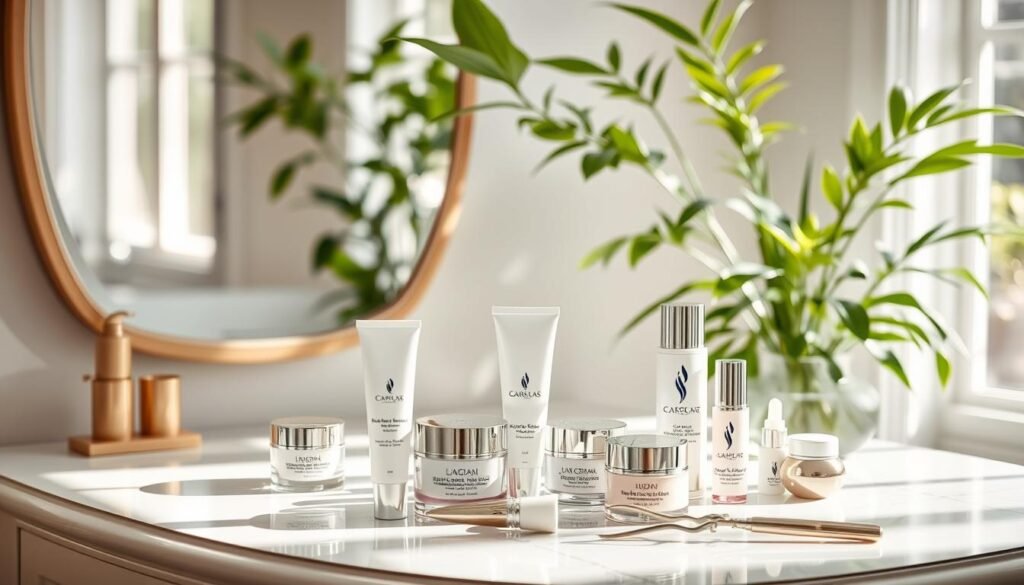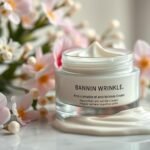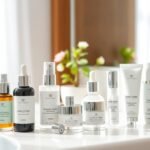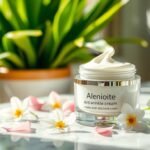Did you know consumers spend billions on anti-aging products every year? The American Academy of Dermatology1 confirms this. It’s amazing how much we seek to keep our skin looking young. Products from Alastin Skincare and Avene promise to reverse skin aging. But, does science back up these anti-wrinkle creams?
The aging process naturally changes our skin, leading to wrinkles and less collagen. Anti-aging creams come packed with ingredients like retinoids and peptides. These ingredients help refresh the skin. For example, retinoids are known to reduce fine lines1. But, it’s key to know that not all creams work the same way.
Some anti-aging creams can help your skin. Yet, treatments from a dermatologist often give better results. It’s smart to talk with a dermatologist about which skincare is right for you.
Key Takeaways
- Consumers spend billions annually on anti-aging creams and lotions1.
- The aging process involves natural changes such as reduced collagen production and a thinner epidermis.
- Key ingredients in anti-aging creams include retinoids, peptides, and antioxidants.
- Differentiating between over-the-counter and prescription-strength products is crucial.
- Consulting a dermatologist can help tailor the best anti-aging skincare regimen for your needs.
Check often for the top reviews on beauty products. We cover everything from the best acrylic nails and nail polish remover to the leading hair growth serums. Find advice on the best skincare routine, moisturizers for dry skin, vegan beauty choices, and cruelty-free makeup. Plus, read on the best anti-aging creams, foundations for oily skin, makeup brushes, and beauty blenders.
Understanding the Aging Process
As we get older, our skin changes because of aging. It is affected by natural factors and outside forces that speed up aging.
Natural Changes in Skin Over Time
The skin’s outer layer gets thinner as we age. We also make less collagen and elastin, which help keep skin stretchy. These collagen boosters keep our skin firm. But their levels drop, causing wrinkles and age spots to appear.
Hyaluronic acid makes young skin full by holding water. As we age, we produce less hyaluronic acid, making skin dry and dull. Skincare with hyaluronic acid can improve skin’s hydration and look2.
Factors That Accelerate Aging
External factors can speed up aging even though it’s natural. Sun exposure is a big cause of early aging signs like dark spots and lines. The American Academy of Dermatologists (AAD) suggests using moisturizer and sunscreen daily to shield skin from the sun2.
Lifestyle choices impact how quickly our skin ages. Smoking, eating poorly, and skipping skincare can make aging signs worse. Smoking, for example, damages collagen and elastin more, leading to deeper wrinkles. Eating healthy and caring for your skin can keep it looking better for longer3.
Starting anti-aging products early is key. It’s easier to prevent aging signs than to fix them later. Retinoids and vitamin C can help boost collagen and elastin even in your 20s4.
Visit us regularly for top beauty product reviews. We share the best picks for acrylic nails, nail polish removers, hair colors, hair growth serums, skincare routines, moisturizers for dry skin, vegan beauty items, cruelty-free makeup, anti-aging creams, foundations for oily skin, makeup brushes, and beauty blenders.
Key Ingredients in Anti Aging Creams

For an effective anti-aging cream, know the key ingredients. The right mix can slow aging signs, keeping skin young.
Retinoids and Their Role
Retinoids, from vitamin A, speed up cell renewal and lessen wrinkles and marks5. Popular retinol serums stimulate skin peeling, boost collagen, and reduce lines6. Neutrogena Retinol Boost shows results in just a week5. Start with a lower strength, use at night to prevent irritation7.
Benefits of Peptides
Peptides help make proteins like elastin and collagen, lost with age. They shield the skin, maintain moisture, and smooth out lines. Lipids like ceramides lock in moisture and tackle aging signs. Oral collagen can also strengthen the skin5.
Importance of Antioxidants
Antioxidants shield skin from damage and enhance health. Vitamin C, a key antioxidant, combats skin damage from free radicals, reducing wrinkles and dark spots6. Using Vitamin C for 12 weeks can lighten age spots and even skin tone7. Adding antioxidant-rich products to your regimen brings long-term gains.
Role of Sunscreen
Sunscreen is vital in anti-aging care6. It guards against sun rays that age and discolor skin7. Applying it daily prevents dark spots from returning, protecting from new damage7. Brands like La Roche-Posay mix sunscreen with anti-aging ingredients effectively.
Keep up with us for top beauty product reviews. Find the best in acrylic nails, nail polish removers, hair color, growth serums, skincare, moisturizers, vegan and cruelty-free items, anti-aging creams, foundations, brushes, and beauty blenders.
Evaluating the Effectiveness: Do Anti Aging Creams Work?
Many people question if anti-aging creams really work. To find out, we must look at the science and actual results.
Scientific Evidence and Real-World Results
A 2005 study found that aging changes our skin, with common problems like skin damage from the sun in 58-69% of people. Research shows that dermatologist-recommended anti-aging products can help with these issues8. Also, hormones play a big role in skin aging, affecting 71-84% of cases as per a 2007 study8. On top of that, a 2006 study emphasized how crucial estrogen is for skin, impacting 83-94% of skin aging process8. Another research in 2002 showed a big difference between natural aging and damage from the sun, with effects in 83-94% of cases8.
In the real world, Americans spend more than $1 billion yearly on anti-aging products9. A test on nine wrinkle creams, costing $38 to $335, showed interesting results. Olay Regenerist, at $57, was the best, while La Prairie Cellular, at $335, didn’t do as well9. This shows that more expensive doesn’t always mean better effectiveness9.
Common Limitations
Even with good results, anti-aging creams have their limits. They’re regulated as cosmetics, not medicines, so they don’t need strong scientific proof of their benefits. This means their effects might be mild and not last long since their active ingredients are in lower amounts than in prescription products. Ingredients like retinol or vitamin C can work differently depending on the product and skin type. People’s reactions to these creams vary, and once you stop using them, your skin might go back to how it was before9.
Keep coming back for top reviews on beauty supplies. You’ll find the best picks for acrylic nails, nail polish remover, hair color, hair growth serums, skincare routines, moisturizers, vegan beauty products, cruelty-free makeup, anti-aging creams, foundations, makeup brushes, and beauty blenders.
Choosing the Right Anti Aging Cream

Finding the right anti-wrinkle cream can be hard. It’s important to talk to dermatologists who understand your skin’s needs. They can suggest products from brands like Alastin Skincare and Skin Better Science. These products tackle issues like fine lines10. Getting advice from a dermatologist can make your skincare routine work better. This is because they consider what your skin is like and its condition.
Consulting with Dermatologists
Talking to a dermatologist is key when picking out anti-aging products. They know which ingredients will work well for your skin. For example, retinols are good for wrinkles but not for everyone, like pregnant ladies11. Dermatologists can also tell the difference between what you can buy in stores and stronger, prescription products. This ensures you get the best advice for younger-looking skin10.
Patch Testing
Before adding new items to your skincare, doing a patch test is crucial. This step helps prevent allergic reactions or skin irritation from strong anti-wrinkle cream ingredients10. Patch tests check if your skin likes the product without making any skin problems worse. You should put a little bit of the product on a hidden part of your skin. Then, see if there are any bad reactions after 24-48 hours.
Using these methods can make a big difference in how well your skin looks and feels. Also, ask your dermatologist about using treatments like botox along with your creams for even better skin care10. To learn about keeping your skin and nails healthy, go to this website.
Come back often to read the best reviews on beauty products. We cover everything from the best acrylic nails and nail polish remover to the best hair color kit. Also, find the best hair growth serum, skincare routine, and moisturizer for dry skin. Plus, there’s info on the best vegan beauty items, cruelty-free makeup, anti-aging cream, foundation for oily skin, makeup brushes, and the top beauty blender.
Conclusion
Anti-aging creams play a big part in a skincare plan aimed at keeping skin young. Yet, they aren’t perfect for everyone. The anti-aging market is huge, making billions, but we still need more research12. The success of these products often relies on their active parts, like Vitamin C and alpha-hydroxy acids12. Moisturizers, too, are key for adding hydration and making skin look better12.
To fight aging, you should mix good products, shield your skin from the sun, and get tips from skin doctors. A study over 56 days showed quick results, in as little as 15 minutes, lasting over eight weeks13. Many people saw improvements in a month or less. This shows sticking with a routine is crucial13.
You can’t beat aging without a healthy way of life, real goals, and guidance from experts. Getting young-looking skin takes time. Be sure to visit us for top reviews on beauty essentials. We cover everything from the best nail stuff to the top skincare items and makeup13.
FAQ
How do anti-aging creams work?
What natural changes occur in the skin as it ages?
What factors can accelerate skin aging?
What role do retinoids play in anti-aging creams?
What are the benefits of using peptides in anti-aging skincare?
Why are antioxidants important in anti-aging products?
How crucial is sunscreen in anti-aging skincare?
Are nonprescription anti-aging creams effective?
How can I choose the right anti-aging cream for my skin?
Source Links
- The Truth About Anti-Aging Products – https://www.livescience.com/36720-anti-aging-products-lotions-supplements.html
- Anti-aging products: What they are, when to use, and more – https://www.medicalnewstoday.com/articles/when-to-start-using-anti-aging-products
- Do Anti-Ageing Creams Work? Our Experts Explain I Olay UK – https://olay.co.uk/skin-care-tips/anti-ageing/do-anti-ageing-creams-work
- What Age Should I Start Using Anti-Aging Products? – The Dermatology Group | Dermatology – https://thedermgrouppartners.com/what-age-should-i-start-using-anti-aging-products/
- 6 Most Effective Anti-Aging Ingredients! | Neutrogena® Skincare – https://www.neutrogena-me.com/beauty-and-skincare-tips/skincare/six-effective-anti-aging-ingredients-for-skin
- The 5 Products You Need for Younger-Looking Skin – https://health.clevelandclinic.org/anti-aging-skin-care
- Anti-Aging Ingredients Found In Skin Care Products – https://www.webmd.com/beauty/ss/slideshow-anti-aging-ingredients
- Skin anti-aging strategies – https://www.ncbi.nlm.nih.gov/pmc/articles/PMC3583892/
- Study: Most Wrinkle Creams Don’t Work – https://www.cbsnews.com/news/study-most-wrinkle-creams-dont-work/
- Do Anti-Aging Creams and Serums Really Work? – https://plymouthmeetingdermatology.com/anti-aging-cream-efficacy/
- Wrinkle creams: Your guide to younger looking skin – https://www.mayoclinic.org/diseases-conditions/wrinkles/in-depth/wrinkle-creams/art-20047463
- The truth about over-the-counter topical anti-aging products: a comprehensive review – PubMed – https://pubmed.ncbi.nlm.nih.gov/19341668/
- Efficacy and Safety of an Anti-aging Technology for the Treatment of Facial Wrinkles and Skin Moisturization – https://www.ncbi.nlm.nih.gov/pmc/articles/PMC5774901/








Interesting article, but isnt embracing natural aging better than chasing the illusion of youth with these creams? Just random food for thought.
Interesting read, but isnt aging a natural process? Why are we so obsessed with fighting it instead of embracing it gracefully?
Honestly, isnt aging just part of lifes journey? Why are we so obsessed with stopping it? Embrace wrinkles, theyre just lifes laugh lines!
Not sold on this anti-aging hype. Anyone else think its just clever marketing exploiting fear of age and time? #JustSaying #EmbraceAging
Aging is natural guys, why fight it? Arent we just feeding into beauty industry profits with these anti-aging products? Just a thought.
Interesting read, but isnt it all just marketing hype to sell fancy creams? Isnt aging a natural process we should embrace, not fight?
Interesting read, but arent we just glamorizing vanity? Isn’t aging a natural process we should embrace instead of fear and try to reverse?
Interesting read, but isnt it more important to embrace aging naturally than to constantly fight it with questionable creams? Just a thought.
Interesting read! But, could the beauty industry just be hyping up anti-aging creams for profit? Ever considered that angle?